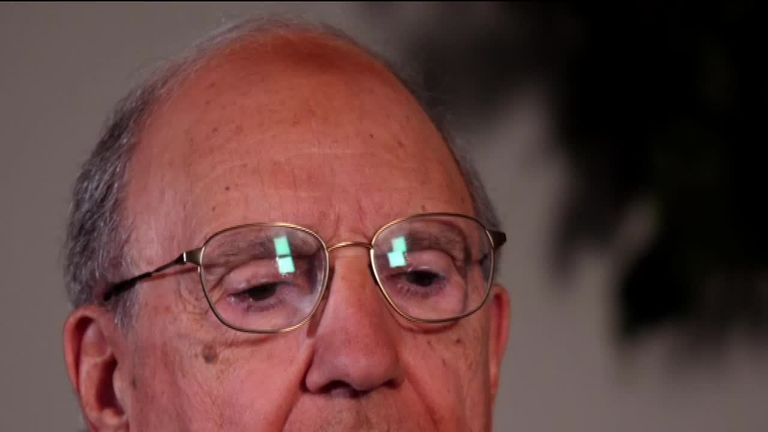Theresa May in Brussels: Will PM finally secure deal on Brexit backstop?
Sky's Mark Stone says the UK needs to find a way for the attorney general to change his interpretation of what the聽backstop means.
Wednesday 20 February 2019 13:45, UK
Ahead of Theresa May's latest visit to Brussels, where are we with Brexit?
I hope the following simplifies the seemingly never-ending process but one which could have an abrupt end in less than 40 days.
Some context first: The key problem is the backstop or the Irish Protocol to use its proper name.
It's a section of the Withdrawal Agreement (WA) - a 585-page legal text which, together with a shorter Political Declaration (PD), forms the divorce treaty between the UK and the EU.
The two texts - the WA and the PD - were the consequence of two years of negotiations. They were finalised and agreed by both the UK government and the EU late last year.
The backstop is an insurance policy - a carefully worded section of the WA designed to guarantee that no hard border would be forced on the island of Ireland if no future trade deal, struck by the UK and EU, itself precluded the need for a border.
The problem is that to function as it's designed to (an insurance policy) it requires the UK to commit to remaining in a customs union with the EU and Northern Ireland aligning on regulation too.
Although the UK government accepted this in December (indeed, it was Downing Street which proposed a backstop in its existing form), the UK's attorney general, Geoffrey Cox, said it theoretically locked the UK to the EU if the backstop kicked in.
Parliament demanded Mr Cox's legal advice was published. It declared that the backstop had no end date or unilateral exit clause.
With this legal advice in hand, MPs in Westminster protested.
So Mrs May tried to get changes at the December EU summit in Brussels. She got only warm words of EU reassurance that the backstop would be temporary. Brussels would not remove it or tinker with the WA.
Predictably, then, in the meaningful vote on 15 January, the deal was voted down.
Which brings us to this week. Where are we now from my perspective in Brussels?
The crux is this: the UK needs to find a way for Mr Cox to change his legal interpretation of what the backstop actually means.
How can he do that?
There are now five government ministers and their departments directly interlocking with the EU side: the prime minister, the foreign secretary, the Brexit secretary, the cabinet office minister and the attorney general.
Behind them are civil servants and, crucially, government lawyers.
Together, this multi-pronged (last-ditch?) effort is pressing the EU for "legally binding changes" around the backstop so that Mr Cox can declare it no longer never-ending.
If you ask the officials in Downing Street, they say that this requires the reopening of WA. Other UK sources say it needn't be touched.
The EU says that while it can offer endless reassurances that they consider the backstop to be temporary, they can't legally guarantee its temporary nature because they can't be sure, now, that a free trade deal (which itself avoids an Irish border) can be signed in the future.
There are two aspects to the EU's immovable position:
:: Solidarity with Ireland in maintaining the principles of the Good Friday peace agreement (which calls for no border)
:: Maintaining the integrity of the EU single market
The first of these seeks to avoid a border, the second requires one.
The only way out of that conundrum is either a rich EU-UK free trade agreement (FTA) down the line, after a transition period.
Or, if no FTA is found, the insurance backstop coming into play, which would see the UK remain in a customs union thus aligning with the EU and avoiding a hard external border.
So the EU says it can't tinker with the backstop, but the UK says it needs a legally binding change which either:
:: Provides a backstop end date
:: Provides unilateral exit mechanisms to the backstop
Once again, the EU says "no" and so on the face of it, the Brexit stand-off seems irreconcilable.
From chats with both sides, my clear sense, at the moment, is that they're wide apart at least in terms of how they are presenting (or spinning?) to us their assessment of progress.
Brexit Secretary Steve Barclay and Mr Cox with UK government lawyers are in Brussels this week meeting the EU's chief negotiator Michel Barnier and EU lawyers.
The plan is for the UK to present a new legal text (or maybe a few text options) as solutions.
It's not clear whether this legal text (or texts), if they do materialise, are designed to stand alongside the Withdrawal Agreement (which is possible for the EU as long as they don't contradict the WA) or be inserted into it (which is impossible says the EU).
But broadly, the UK side is heartened that Mr Barnier is, as they see it, engaging in the process.
Downing Street's hope is that UK lawyers will find counterparts in Brussels willing to agree to the changes thus allowing Mr Cox to declare the backstop no longer a problem.
With the new revised legal interpretation from Mr Cox, Mrs May would table a new meaningful vote to parliament next week, which would see the deal pass.
Yet top sources at the heart of the EU tell me this scenario "sounds very optimistic".
There is a summit of EU leaders (with Arab counterparts) in Egypt this Sunday. French President Emmanuel Macron is the only key EU leader not attending.
Mrs May is yet to confirm attendance but she's likely to go.
While there's a desire not to talk Brexit in Egypt, it will be a key opportunity for Mrs May to talk face-to-face with leaders about whatever emerges over the next three days in Brussels.








